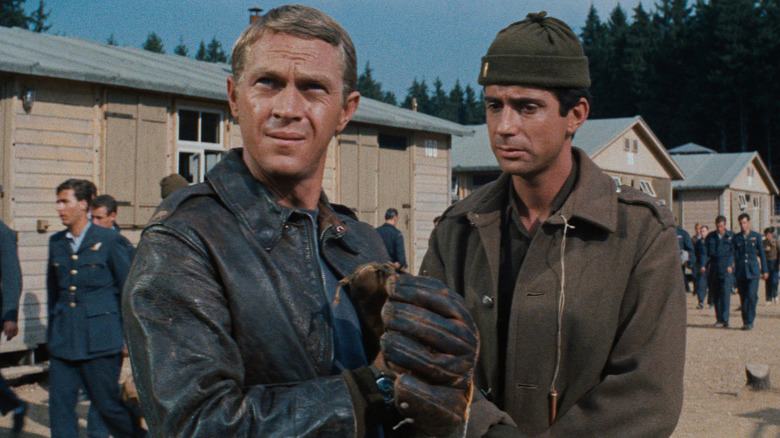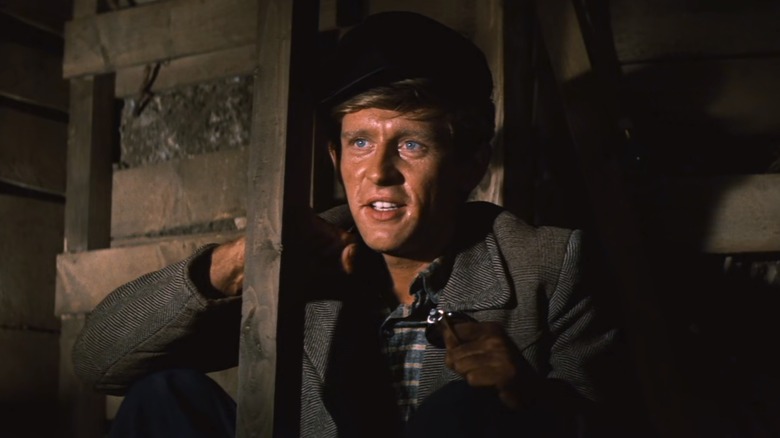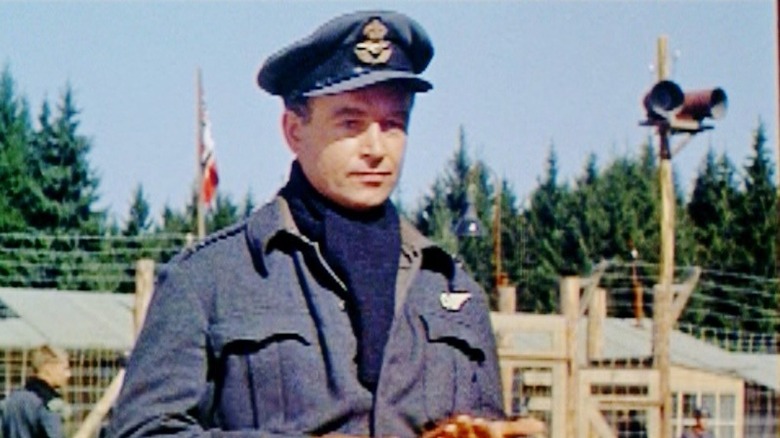The Only Major Actors Still Alive From The Great Escape
The late 1950s and the entirety of the 1960s were the golden age for big, brawny, studio-produced action-adventure epics. Films like "The Bridge on the River Kwai," "The Guns of Navarone," and "The Train" plopped big movie stars in the midst of finely crafted yarns about unflappable heroes pooling their expertise to pull off seemingly impossible tasks. Most of these were next-phase World War II movies that eschewed the reverential tone of the films made in the immediate wake of the conflict's end; they were less about the Axis enemy and more about the ingenuity of men in high-pressure situations. When done well, they were hailed by critics and ticket-buyers alike.
And with due respect to the many entertaining entries in this subgenre, none of them can match the armrest-shredding suspense and rousing camaraderie of John Sturges' "The Great Escape."
Working from a screenplay credited to W.R. Burnett and the wildly versatile James Clavell (which was based on a book by Paul Brickhill), Sturges endearingly captures the dutiful escape efforts of British and American WWII POWs being held at a German prison camp. Rather than despair, these men enthusiastically, almost cheerfully hurl themselves into the meticulous process of breaking out of this fiercely guarded detention center. To many of them, especially Richard Attenborough's squadron leader Big X, it's a thrilling challenge. The detainees are well aware they've been placed here because they're prone to fleeing, so this is, essentially, their coop-flying Super Bowl.
Everything works here, but the cast may be the film's most important element. It's a murderer's row of men's men that includes Steve McQueen, James Garner, Charles Bronson, James Coburn, and David McCallum. But it's not all throbbing testosterone: Donald Pleasence, James Donald, and Hannes Messemer (as the strangely sympathetic Kommandant) play against the macho grain in their own way.
It'd sure be swell to get these legends together for a reunion screening, but "The Great Escape" was made 61 years ago, which means these men are all quite dead. Well, almost all of them. There are two surviving members of the escape effort. So let's celebrate them while they're still with us!
John Leyton (Willie Tunnel King Dickes)
Some of the tensest moments of "The Great Escape" deal with the tunneling exploits of RAF Flight Lieutenants Danny Welinski and Willie Dickes. Bronson is particularly memorable as the claustrophobic Danny (a troublesome quality for a guy stuck on his back under 30 feet of collapsible soil), but John Leyton is also terrific as Danny's best friend, who talks him through his panic.
Leyton, who turned 87 last week, has had an interesting career. He studied acting in his teens and early 20s and became something of a teen idol in 1960 due to his portrayal of plucky sidekick Ginger Hebblethwaite on the 1960 TV adaptation of "Biggles." Leyton was being managed by British entertainment kingmaker Robert Stigwood at the time, and the man who would go on to turn the Bee Gees into pop superstars saw chart-topping potential in his young client. His instincts proved spot-on when Leyton scored a number-one hit in the UK with the death ditty "Johnny Remember Me."
Leyton's pop career gradually cooled off after this triumph, which allowed him to transition back to acting. He'd mostly been cast as himself during his brief pop stardom, so "The Great Escape" offered him the opportunity to prove himself as a serious performer. While he was great in the film, directors immediately typecast him as a team member. He went on to appear in big-ticket productions like "Guns at Batasi" (which reunited him with Attenborough) and "Von Ryan's Express" (starring Frank Sinatra).
Leyton's career tailed off in the 1970s, but he experienced a resurgence in the 1990s as part of the nostalgia-driven "Solid Gold Rock'n'Roll Show." He recorded a novelty cover of Jeff Beck's "Hi Ho Silver Lining" in 2006 to coincide with the World Cup in Germany and was still touring in the 2010s. It appears he's enjoying a richly deserved retirement nowadays.
William Russell (Soren Security)
If you're a "The Great Escape" superfan, you might recall William Russell's portrayal of Sorren, a member of the breakout effort's security detail. And if you're a television historian, you might be able to point to his breakout lead performance as Sir Lancelot on the Arthurian series "The Adventures of Sir Lancelot." The show aired between 1956 and 1957 and was so popular that NBC picked it up for a stateside network run. It was also the first British TV series to have entire episodes shot in color (though you had to be a real moneybags, and live in the U.S. to see it broadcast in color).
Russell's probably best known today for originating the role of read-for-action science teacher Ian Chesterton in "Doctor Who," but eagle-eyed geeks could possibly pick him out of a lineup as the 8th Krypton elder in Richard Donner's "Superman." Scanning his filmography, I see that he was in Bertrand Tavernier's prescient 1980 science fiction drama "Death Watch," in which a woman (Romy Schneider) becomes the subject of a reality show when she is diagnosed with an incurable illness (an extreme rarity in this film's strangely somber future).
Russell returned to the part of Ian Chesterton in 2022's "The Power of the Doctor." He turned 99 last November, so happy belated birthday, sir, and thanks for the memories!


